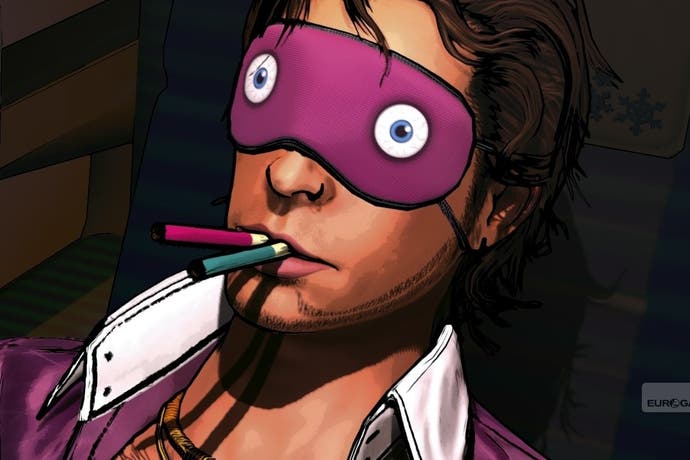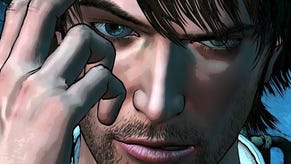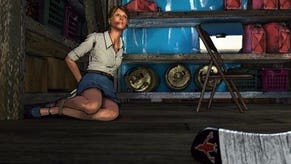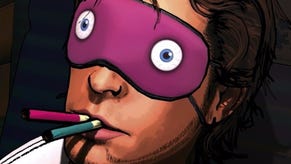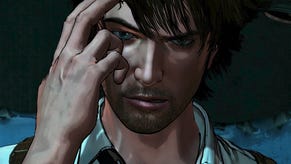D4 debut episode review
The hand of odd.
Editor's note: We're trying a new approach to reviews of episodic game series like D4, inspired by our approach to early access releases and some online games. The debut episode will be reviewed without a score, as here, and we'll review the whole season with a score at its conclusion.
My first reaction? Relief. It turns out that Swery, the mercurial game director responsible for the unforgettable Deadly Premonition, is the real deal. My great fear going into D4: Dark Dreams Don't Die, his long-awaited follow-up and an Xbox One exclusive, was that the eccentric mixture of leftfield drama and oddball gameplay mechanics that made Deadly Premonition so unique was just a happy accident: a series of bad decisions that turned into something bizarre and fun by pure fluke.
D4 says otherwise. The style of game couldn't be more different - this is a point-and-click episodic adventure game rather than a sprawling survival horror - but the tone is gloriously similar. This is a game where almost everything is just slightly out of the ordinary, as if an invisible hand reaches in and twists every scene, every mechanic, every input a few degrees off centre. It's dizzying, disorienting and constantly distracting. And now, we see, it's clearly on purpose. Swery isn't an inept designer who hit on a cult formula, but a natural maverick whose singular approach to character, story and gameplay can't help but result in experiences that are gloriously out of sync with everyone else.
Suffice to say, the rest of this review could easily be filled with context-free incidents, characters and lines of dialogue that baffle, surprise and delight. The lead character is David Young, a former Boston cop who now works as a sort of psychic private eye. His wife was murdered, leaving only a cryptic clue that he should seek out "D" to discover the culprit behind her demise. At the same time, and for no apparent reason, David also gains the ability to travel in time.
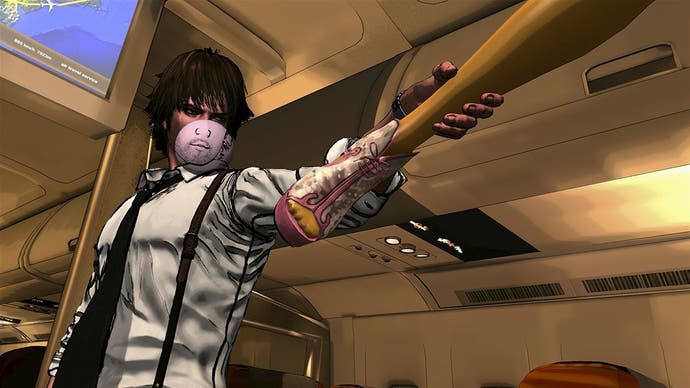
It's a gift with limits, though. To jaunt back to the past, he first needs a "memento" - an object that can link him to a specific place and time. Then he performs what he calls a "dive" and appears in the past, where he's free to explore and investigate. In other words, it's a handy way to parcel this episodic game up into discrete, self-contained chunks as David dives into different scenarios to move the story along.
With D4, however, he comes up against an immovable object that could stymie even the most mercurial talent: motion control. This is a game designed with Kinect in mind, although it is also playable with a controller.
You can move to specific points in each location, designated by a footstep icon, and in each spot you can rotate your view and also pan left and right slightly. Sweeping your cursor over interactive objects,or characters allows you to either grab or push them - though "grab" quickly becomes an all-purpose "action" prompt rather than actually taking hold of things.
It's a slightly lumpy way of navigating, but then Swery's games often feature such user-interface hurdles to overcome. What is disappointing is that for all his weird flourishes, the Kinect controls are predictable and frankly pointless. They come closest to becoming interesting during action scenes, but even then jumping and ducking is nothing new. You might as well save yourself the bother and go straight for the controller. The Kinect implementation is good, as far as these things go, but it adds little to the experience.
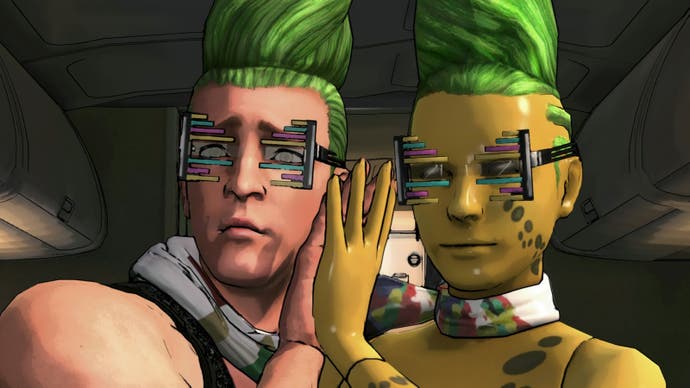
Unfortunately, there's no way to tell the game you want to stick with that control method, and I found that it would frequently interpret some movement in the room as a request to switch back to motion control. You can switch back again easily enough, but it becomes pretty annoying.
There are, at least, lots of things to interact with. You earn credits for collecting trophies floating in the environment, but also for pretty much every interaction. Push something or open something and you'll earn more credits that can be used to top up David's various status levels. Every interaction drains energy, for example, and must be kept refreshed by eating food. You also have "vision" - a mode that highlights interactive features yet to be explored - and this also runs out as you use it. Finally, there's old-fashioned health, depleted by performing badly in the game's QTE-style action sequences. These aren't too punishing, either using Kinect or a slightly odd sticks-and-triggers input system, and the actions on screen are often delightfully choreographed.
There are also letters from David's wife to collect and "scrapbook" entries culled from magazines lying around in the world. These range from features about spontaneous combustion to a multi-part history of the Stanley Cup. It's a typical non-sequitur style of gameplay, and while the game - so far - doesn't offer anything as memorably bonkers as the legendary "sinner's sandwich" or "F K coffee" cut-scenes from Deadly Premonition, it comes pretty close.
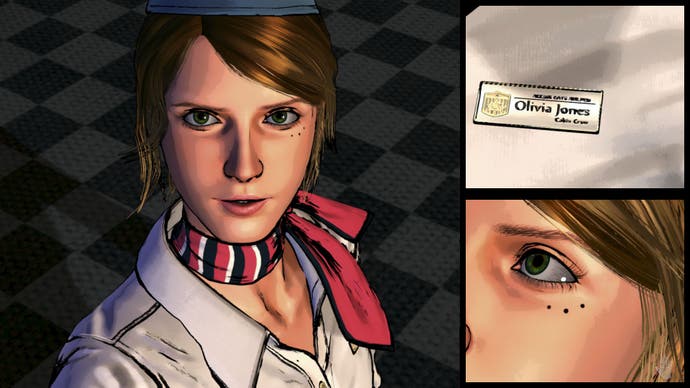
One of the first characters you meet is a young woman who thinks she's a cat. The game hints that she may actually be a cat, or at least the reincarnation of David's deceased wife's pet. The game offers bonus cases, but the first of these you'll trigger involves nothing more than a lengthy conversation about clam chowder.
Once into the first proper investigation, on board a passenger plane in flight, things get stranger still. A passive-aggressive flight attendant frets over a lost glove and quizzes you on air travel trivia. There's a fashion designer with a bright green ice-cream-cone hairstyle who is in a relationship with a golden mannequin called Sukey. At one point, you wield Sukey's leg as a baseball bat. There's a giant dressed as a surgeon with a fetish for cutlery.
The dialogue is weird, the line readings even more so. It's as if an alien tried to piece together a hard-boiled detective story based on distorted TV signals and fragments of comic book pages. The visuals are a vast improvement on Deadly Premonition's, but characters are still prone to inexplicable and hilarious movements and facial animations. It's worth trying all the fortune cookies in David's apartment, just to see the bewildering array of reactions he has to their contents. The soundtrack, meanwhile, is constantly at odds with the on-screen action, flitting from light jazz to blues boogie apparently at random.
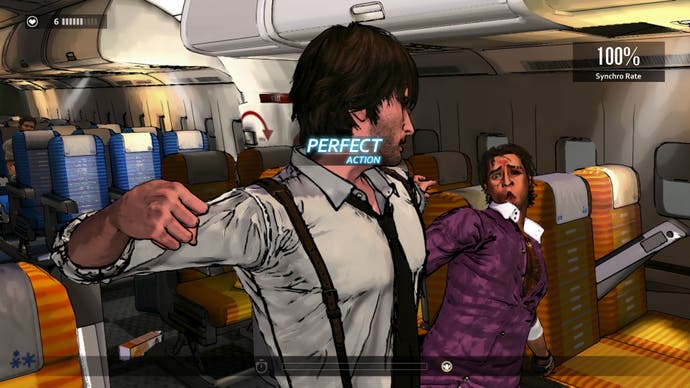
It's this all-pervading weirdness that is the ultimate draw, of course. In gameplay terms, D4 is much more polished than Deadly Premonition. There are far fewer opaque systems to wrestle with and there's almost no chance to wander off the path and get lost in its oddball world. It's easier to play and that, somehow, makes it a little less interesting. Part of Deadly Premonition's immense charm came from your reaction to it - that constant, nagging question of whether Swery was in on the joke or whether he was some kind of idiot savant who happened to make the perfect cult game.
D4 isn't quite that game, but it is still more genuinely surprising and hilarious than anything else around at the moment, and the episodic format really seems to suit Swery's sensibilities. You get the first two episodes and a prologue in this initial download, a generous amount of gameplay that nevertheless leaves you wanting more. The signature weirdness still feels natural, maybe more digestible in these vignette-style encounters, and it still challenges you to find the pleasure in an experience that refuses to conform to industry standards of pacing, polish and presentation. Like its predecessor, it asks you to come up with a new vocabulary for what makes a game enjoyable, and that's truly exciting.
We'll hold off on a final score until the full season has been released, but for now D4 is a game that confirms Swery as a truly eclectic and distinctive outsider artist. In a medium that so often lazily co-opts the language of cult cinema, or pays surface homage to pulp fiction while missing its offbeat heart, that's something worth celebrating.
